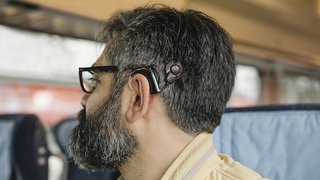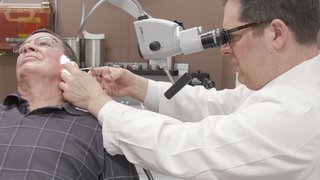Why are hearing, balance, and facial disorders grouped together? The answer is location. The facial (VII cranial) nerve extends from the base of the skull, courses through the temporal bone and comes in proximity to the inner ear and the vestibuloauditory (hearing and balance) nerve, or VIII cranial nerve. The facial nerve then passes through the salivary gland, and divides and connects to facial muscles, the tear gland, and the tongue.
The inner ear includes both the organ for hearing (auditory) and for balance (vestibular). Because a small bit of common ground in the temporal bone is shared by these three systems, when something happens to one the other two could be at risk.
Facial nerve disorders do not occur as frequently as hearing and balance disorders. In fact, vertigo, hearing loss, and tinnitus are common complaints of men and women of all ages. Often striking during the most productive years of life, the disorders typically worsen with age. Severity of symptoms may range from minor to catastrophic and incapacitating limitations in function. Despite their frequency and potential for severity, hearing and balance disorders are usually subjective in nature and not life-threatening.
While patients who suffer from hearing loss, tinnitus, or disequilibrium continue to present a challenge to the medical profession, new technological and medical advances permit many patients to be successfully evaluated and treated.
UT Southwestern physicians are highly respected for their skill in diagnosing and treating hearing, balance, and facial disorders. We use a team approach to address your specific conditions to get you back to good health.
Hearing Loss
Hearing loss affects an estimated 20 million Americans, and ranges in severity from a minor nuisance to a profound disability. It can be a frightening and isolating condition in its more severe forms.
The ear is an exquisite device providing the input necessary for us to live in the hearing world. As with most valuable things, the ear is as fragile as it is useful. There are many things that can affect any or all parts of the outer, middle, and inner ear.
If you have hearing loss, regardless of the cause, you’ll receive a comprehensive medical evaluation of the ears from one of our physicians (otologists) specializing in the ear and hearing.
Once evaluated, you may benefit from medical or surgical intervention. Or, you might seek further evaluation from a UT Southwestern Medical Center audiologist to determine whether hearing aids, cochlear implants, or other forms of rehabilitation would be appropriate.













